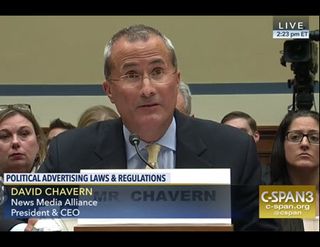Edge Providers Have D.C. on Edge

WASHINGTON — Edge providers are beginning to take more heat in the nation’s capital.
The bigger edge providers — companies that provide online applications, content or services, such as Google, Facebook or Yahoo — are being branded as gatekeepers of information, and getting called out as non-neutral online content arbitrators. That was once the exclusive province of internet service providers such as Comcast, AT&T and others, who have been branded as the snakes in the virtuous circle of content to network to consumer.
The doesn’t mean the pressure is off ISPs, particularly on the issue of Title II reclassification, but the vice is starting to twist more on Silicon Valley poster companies that pretty much got a pass in discussions about controlling the overall access to information.
The turning of that bitter worm was clear as one prominent House Democrat laid into edge providers, and at an Oct. 24 House hearing on political advertising saw newspaper publishers roll up their collective editions and spank Google and Facebook as peddlers of fake news for a buck.
Democrats on the House Energy & Commerce Committee have been talking among themselves about the optics of leaving edge providers out of the speech debate, particularly given the rise of fake news — i.e., the real kind, rather than the accusations of President Donald Trump against mainstream media.
Related: Some Troubled by 'Trump TV'
That came to something of a head, or at least to a signal of changing political fortunes, when Rep. Frank Pallone (D-N.J.) requested a briefing with edge providers that he accused of shaping news content.
“With a goal of ad clicks or driving page views, these companies’ policies are not neutral; they actively shape content on the web,” said Pallone, who sent a letter to Google, Facebook and Twitter seeking a briefing on their policies for “moderating content and advertising” as social media’s role in fake news and Russian election meddling swirled inside the Beltway.
Pallone was also responding to reports of vague, confusing and inconsistently applied content guidelines.
A Hill source said Democrats on the Energy & Commerce Committee are clearly trying to include tech firms in conversations about their role in net neutrality and the First Amendment going forward.
“The influence of the internet over our national dialogue and our lives has skyrocketed over the past decade,” Pallone said. “At the same time, the number of websites handling this traffic has consolidated to a handful of key platforms. The combination of these trends has led to these few companies taking on a quasi-governmental role policing content.”
Page Views vs. Page Turns
Pallone suggested that inconsistent application may be tied to the desire to boost page views and ad clicks, foreshadowing the complaints of the News Media Alliance at a hearing on political advertising last week.
Only a day after Pallone’s letter was made public, the head of the News Media Alliance, which represents almost 2,000 newspapers, pressed the issue in a hearing with House members on political advertising and a bill, the Honest Ads Act, that would require broadcast-live disclosures on online political ads.
Related: NMA Says Google, Facebook Business Models Fuel Fake News
While ISPs have gotten used to being called internet gatekeepers on Capitol Hill, NMA president David Chavern said that Google, Facebook and other edge players are news gatekeepers that have fueled fake news and “harmed the integrity of content and advertising.”
That’s because the edge business model is based on “not exercising responsibility over the integrity of content of the advertising that sustains its foundation,” Chavern told the House Oversight Committee’s Information Technology Subcommittee.
Chavern said that the public “should no longer have to suffer from unreliable information because it is profitable, while producers of content [such as his newspaper members] continue to hold ourselves to a higher standard.”
Multichannel Newsletter
The smarter way to stay on top of the multichannel video marketplace. Sign up below.
Contributing editor John Eggerton has been an editor and/or writer on media regulation, legislation and policy for over four decades, including covering the FCC, FTC, Congress, the major media trade associations, and the federal courts. In addition to Multichannel News and Broadcasting + Cable, his work has appeared in Radio World, TV Technology, TV Fax, This Week in Consumer Electronics, Variety and the Encyclopedia Britannica.

